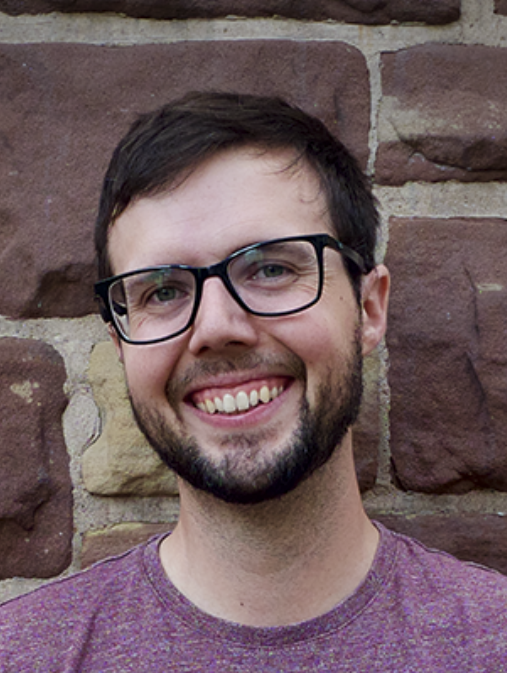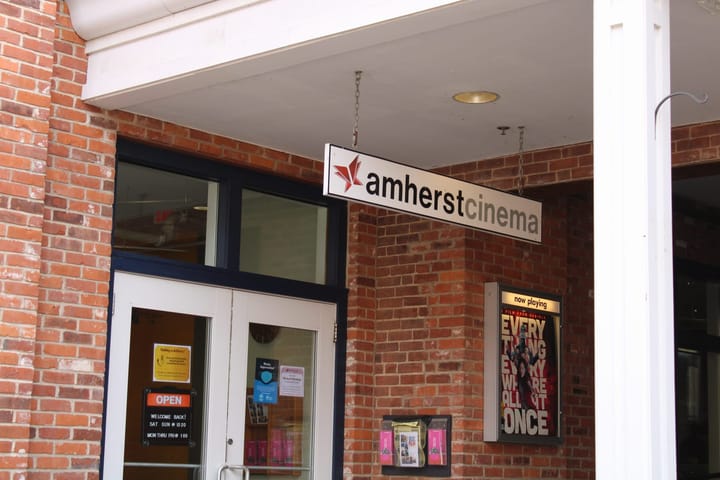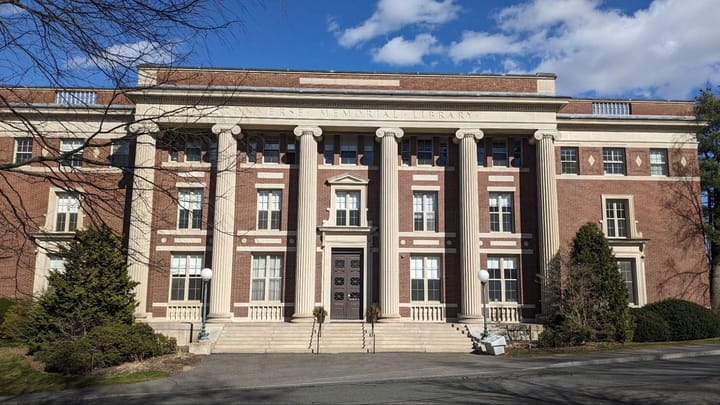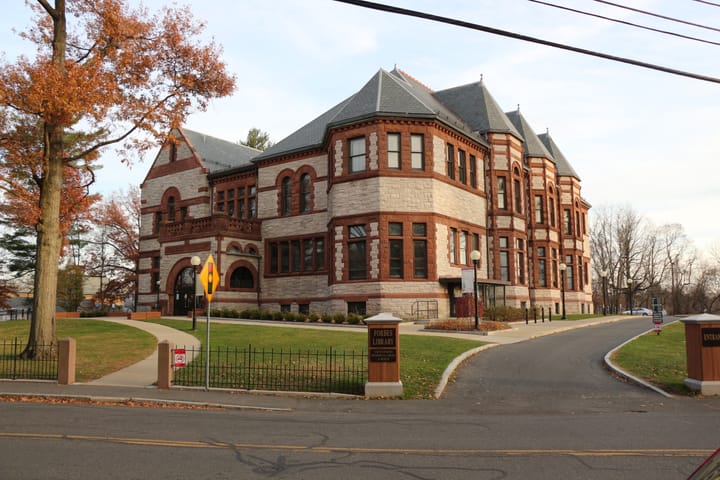Fresh Faculty: Will Rosenbaum

Will Rosenbaum is an assistant professor of computer science. He received a bachelor’s degree from Reed College. He attended the University of California, Los Angeles (UCLA), where he earned a master’s degree and doctorate.
Q: How did you become interested in computer science?
A: I kind of came to computer science by accident through math. So, my undergraduate degree is in math, and actually, my Ph.D. is in math as well. When I was a graduate student at UCLA, I wasn’t sure what I wanted to specialize in, so I was just dabbling and taking classes, and one of the courses that I took was this course in discrete math and combinatorics called “The Probabilistic Method” by this really incredible instructor, Benny Sudakov. [This course] addressed some of the frustrations that I was having with math — just building more and more theory but not getting to the level where I was able to address the interesting questions in math myself — and I found that the problems that were addressed in this class were all inspired from problems in computer science and relevant to computer science. So I started taking more courses that were closer to [computer science] and ended up finding my advisor who was joint in the math and computer science departments at UCLA.
I found it really satisfying that, in computer science, you have this wellspring of problems that are interesting mathematical problems, but they’re not such old problems that people have been working on [for] so long that you’re never going to find an elegant and simple solution to them. I really enjoyed that, in computer science, I felt like I was more able to participate in the discourse and have something new and relevant to say. And so I just kept going with that and slowly moved closer to computer science. Although, I would say my research still is very much at the interface of math and computer science — you know, mathematical problems that are inspired by applications in computer science, but very much interesting in both fields.
Q: What problems do your current research initiatives address?
A: Right now, I have a few very disparate projects that I’m working on. One that I’ll actually be directing a group for the [Summer Science Undergraduate Research Fellows] program this summer is related to packet routing and networks. It’s this kind of general problem, [where] you have a network — whether it’s a network of computers or a network of post offices or anything — and you have some sort of objects that you want to move from one place to another. And the question is, how can we do this efficiently? In particular, what I’m interested in is understanding how we can move all of these objects from wherever they start to where they need to go, in such a way that minimizes the amount of storage we need while they’re in transit. I’ve been working on problems related to this for a few years now, but there’s still a bunch of really elementary problems that we don’t know how to solve yet, and the hope is that, this summer, I’ll be able to work with students and get some better intuition about what might be possible and what’s not possible.
There’s another research project that I’m also working on in this field called sub-linear time algorithms. The idea is that you have some problem [where] the input to the problem is so large that you can’t see the entire input. Usually in computer science, you assume that you know what data you’re operating on while you’re performing some operation, but here, we want to say: “okay, there’s so much data, so much input, that you can’t see it all, but you can kind of selectively look at parts of the data.” And then you want to answer with some confidence questions about the input. Our collective understanding of what’s possible in this sub-linear time model is really limited, so I’m hoping to learn something new about that as well.
Q: What were your motivations for coming to Amherst?
A: [There were] a few things. In terms of just the impression that I was left after coming here to interview, the first thing was [that] everyone that I talked to — or, all of the faculty that I talked to — when I asked them what the best thing about the college was, no one hesitated, everyone said, “The students.” And I got a glimpse during my interview of why everyone said that, when I gave my talk to the computer science department. I mean, the students just had such phenomenal and insightful questions about the talk that I gave, connecting it not just within the narrow confines of the discipline of computer science, but asking about the relevance of what I was working on outside of computer science. I really liked that part of the culture here: of viewing problems as not just being in one discipline rigidly defined, but being truly interdisciplinary. That was a theme that continued throughout every conversation that I had with everyone, both faculty and students, and that really resonated with me.
There are a couple of other things that I think are unique. [For instance], how the college is situated in the Five College Consortium, so that you have the intimacy of a small liberal arts college here, but right up the street, there’s a major research university that has complementary resources in terms of doing research and things like that. I mean, [Amherst] really was a uniquely compelling place for me to pick, and I was really pleased that I was able to come here.
Q: Last semester was your first semester as a faculty member. What was it like teaching your first semester here during a pandemic?
A: It was overwhelming, I’m not gonna lie. Leading up to the first day of class, I just had no idea what to expect. I prepared as much as I could, but I hadn’t taught a class online before. I hadn’t taught a class to Amherst College students before, and so there was a lot of uncertainty, [but] I think it went fairly well. I mean, I had a really good time just getting to know the students, and I felt like I did make real connections with a sizable group of students in the class, and that was really nice. But it was definitely challenging, because you don’t get those kinds of casual, small interactions day-to-day of just passing someone in the hall and striking up a small conversation. Especially because I knew so few people here before I arrived, it was definitely hard to be without that, those kinds of, small interactions that individually don’t seem that valuable, but in aggregate make a huge difference on your perception of how things are going around you. So I think it was very challenging, but I hope that some of the lessons that I learned from that experience will also translate when we’re able to be in person again, and make me rethink or question some of the assumptions that I had about teaching beforehand.
Q: What are some of those lessons that you’ve learned from last semester?
A: I think the biggest thing is just how important it is to connect with people, and how much learning is a social problem. It’s incredibly difficult to just sit in a room with a book or in front of a computer screen and actually learn material for yourself, because the process of learning, I think, is this process of refining and questioning your understanding, and it’s so much easier to do that if you have another person that you can quickly bounce ideas off of or even just try to explain your understanding of a problem to. In some ways, Zoom and teaching on Zoom forced me to just be very deliberate about making sure that students are having those opportunities, and I think, going forward, I’m going to be more cognizant of treating learning as a social problem just as much as an individual thing. So, I think that was maybe the biggest takeaway, and it’s something that I’m still trying to understand and refine my approach [to].
Q: When you’re not doing research or teaching, how do you like to spend your free time?
A: I don’t have much free time these days. By far, the most rewarding and biggest thing that I’m spending my time doing is just being with my daughter, who’s three and a half years old. I mean, it’s a lot of work to keep a three-year-old happy and occupied, but it’s a tremendous amount of fun. She’s at this age where she’s just very inquisitive and also very sassy right now, just kind of growing into her personality. So that’s definitely the biggest thing that I’m doing these days. I also enjoy cooking a lot, which is one of these things that I can share with the family, which is good. And I play piano, although I’ve really not had time to maintain any semblance of improvement. But at least it’s something that I can do to relax a little bit.
Q: To close out this interview, what is something that gives you hope for the future?A: Oh man, that’s a really good question. I guess this ties back into your question about why I chose to come to Amherst, and that’s the students and seeing how many bright and motivated and hardworking young people there are that have so much more perspective on social problems, on, big societal problems than I had when I was college-aged. I think this does give me a lot of hope. Obviously, the pandemic has been tremendously hard on a lot of people, but I hope that in straining the system, hopefully not past its breaking point, we’re able to come back to things with fresh eyes and a new appreciation of what’s important. And, hopefully, as a society, we’re going to be able to fix some of the problems that have been persisting in communities for so long. So, I see promise in young students, especially the students at Amherst College, and I think [that that] is a big source of optimism.





Comments ()